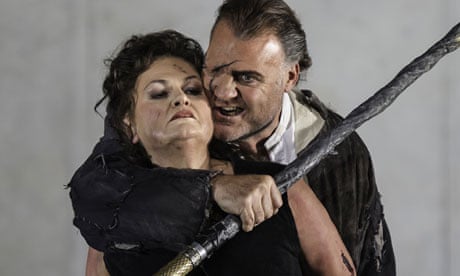A dot of light expands to devour the darkness; the waters of the Rhine surge and heave; primal rumblings rise up from the pit, itself in blackout as the music starts. Covent Garden’s Ring Cycle, in the first opera, Das Rheingold, begins with the Big Bang. Or at least, a Biggish Bang, the birth of a parallel universe which will end in black catastrophe before, in the radiant final bars of Götterdämmerung many hours and several days later, Wagner hints at redemption and new life.
Between this alpha and omega, a Wagnerian roll call of synchronised aquamaidens, asbo gods, knitting sybils, dwarves, giants and female stormtroopers together weave the complex tapestry of lust, ambition, grief and greed which is Wagner’s four-part pagan masterpiece. This sold-out ROH revival has a top cast led by two British stars of world-class standing, Bryn Terfel and Susan Bullock. In Marie-Jeanne Lecca’s costumes these everyday mythical folk are kitted out in an eclectic array of patterned velvets and workaday hemp – in time (roughly 19th century) and, in the case of the hirsute, shrieking, skull-clutching Valkyries (excellent they were too), timeless.
The Royal Opera House has taken the risk of performing four complete cycles, a daunting test of stamina, instead of the usual three preceded by a paid dress rehearsal, a chance to establish confidence in front of an audience. Given the expense of staging the Ring, and the fact that all the cycles (top price £1,000) immediately sold out, you can understand the ROH’s thinking, though with hindsight they may have been impetuous.
Both Rheingold and Die Walküre, the first two operas, had incandescent moments but still felt provisional, with more than a few clumsy manoeuvres and minor hitches. Lucky those who will see subsequent cycles, which will surely grow with each enactment. There were lapses between stage and pit in Rheingold on Monday, but generally the sense of caution had vanished by Die Walküre on Wednesday. Singers had warmed up; the orchestral sound begun to glow and coalesce.
The Royal Opera’s music director Antonio Pappano, steeped in this music, is a judicious, generous Wagnerian, with a passionate comprehension of score and text. The sight of six harpists undulating in their side-box above the pit offers its own theatre. The horns barked hideously to warn of Hunding’s hounds. Cellos and low woodwind made rapturous love music for the Wolsung twins Siegmund (Simon O’Neill) and Sieglinde (Eva-Maria Westbroek). If theirs was not the most tempestuous of incestuous encounters, it had its own urgent compulsion.
There was a new intimacy in the key exchanges, particularly between Wotan (Bryn Terfel) and his wife Fricka (a cool, severe and wonderful Sarah Connolly), and between Wotan and his favourite daughter, the “expression of his will”, Brünnhilde. Susan Bullock, in her first complete cycle for the ROH and not a minute too soon, has extraordinary power, her voice ringing out from upstage even when her back is turned to us. She radiates tender emotion in every gesture, essential but by no means a given for this archetypal Wagner heroine. As Wotan, Terfel, now fully inside the role, has towering stage presence, intelligence, anguish, a sense of this god’s bloody-mindedness and fallibility. His “Farewell” to Brünnhilde stirred immense pathos.
Directors have always struggled to say something new about Wagner’s music-drama. Marxism, capitalism, industrialisation, ecology: there’s space for any hobbyhorse. For the Royal Opera, Keith Warner has taken on the current enigmas of cosmology and biochemistry. Wagner knew nothing of the search for dark matter and eerie bosons when he wrote Der Ring des Nibelungen. Neither, at a guess, did most of the audience when Warner’s staging for the Royal Opera House was new, entering the repertoire in instalments from 2004 before a complete cycle in 2007.
We may not, then, have spotted immediately all the double helix imagery in the late Stefanos Lazaridis‘s designs. Now it has become common visual vocabulary. An arc of metal, a spinning propeller, balls of coiled barbed wire? No, don’t tell me. Just DNA doing its thing again. When Sieglinde and Siegmund recognise, with hopeless horror, that they are brother and sister, husband and wife, the huge splayed spiral of metal which dominates the stage turns ice blue as if to say, it’s all in the genes.
There are other preoccupations, perhaps too many: the philosopher Feuerbach‘s influence on Wagner, a reference to Hitler’s Berchtesgaden eyrie in Wotan’s salon, a red rope whose appearance is frequent but whose purpose, if I ever knew, I have forgotten again. Assisted by four associate producers, Warner has streamlined this revival: fewer bodies on slabs in Nibelheim, less furniture, more children; Erda comes up through a hole in the earth instead of sitting in an armchair. Wotan plunges down the same orifice in search of her at the end of Rheingold, implicitly breaking his marriage vows while Fricka climbs the wobbly Rainbow Bridge.
The unquenchable John Tomlinson, who stood in at the last minute as Wotan in 2007, is back as a menacing Hunding, bristling with violence, a thug who takes his axe to bed with him. His wise and benign presence, even playing a villain – hard for those of us who only see him as one of the opera world’s great heroes – gives added authority to all.
Next up: Siegfried and Götterdämmerung. To see how a Ring Cycle evolves, turn to Gary Kahn’s exhaustive interview-based book The Power of the Ring, just out in paperback. In a gesture of similar dedication, Radio 3 will broadcast the Ring live (16, 18, 21, 24 October), then act by act over the Christmas period. Either way, you need to book a holiday if you want to hear the whole of this epic and have time to recover.

Comments (…)
Sign in or create your Guardian account to join the discussion